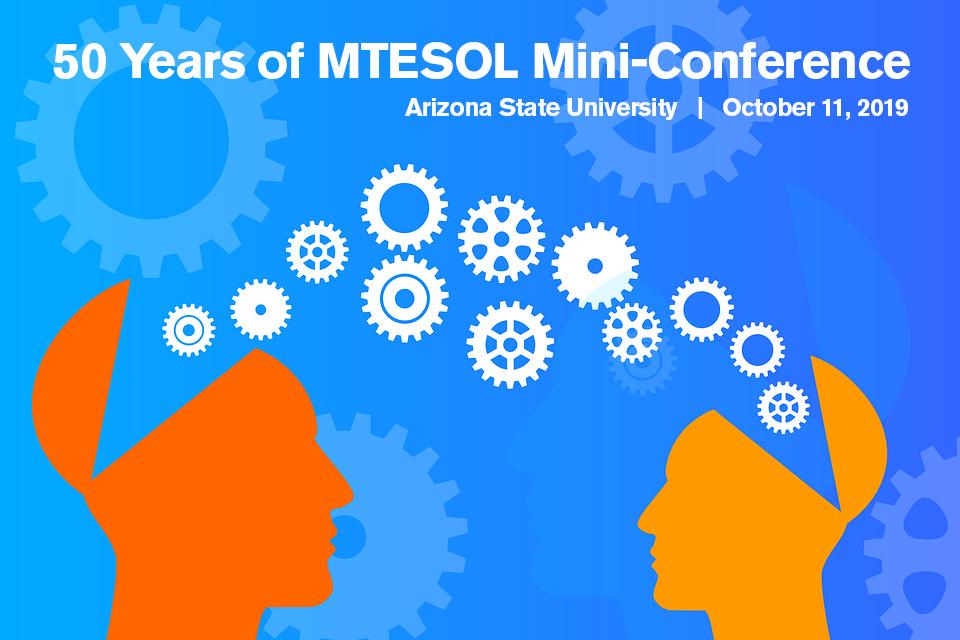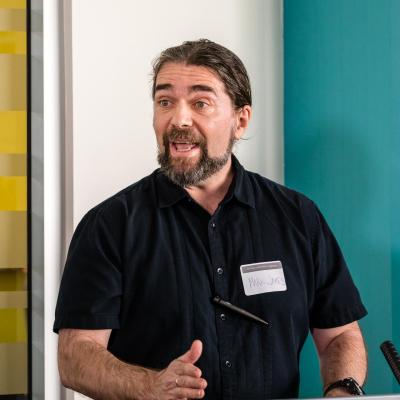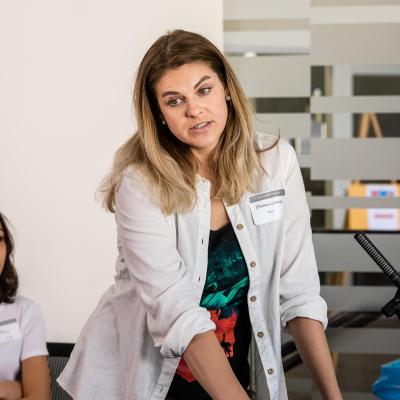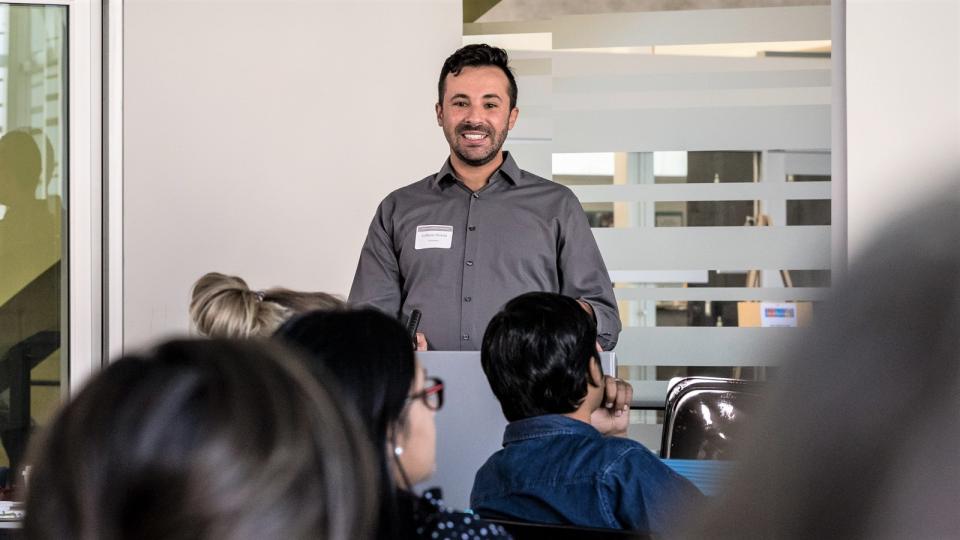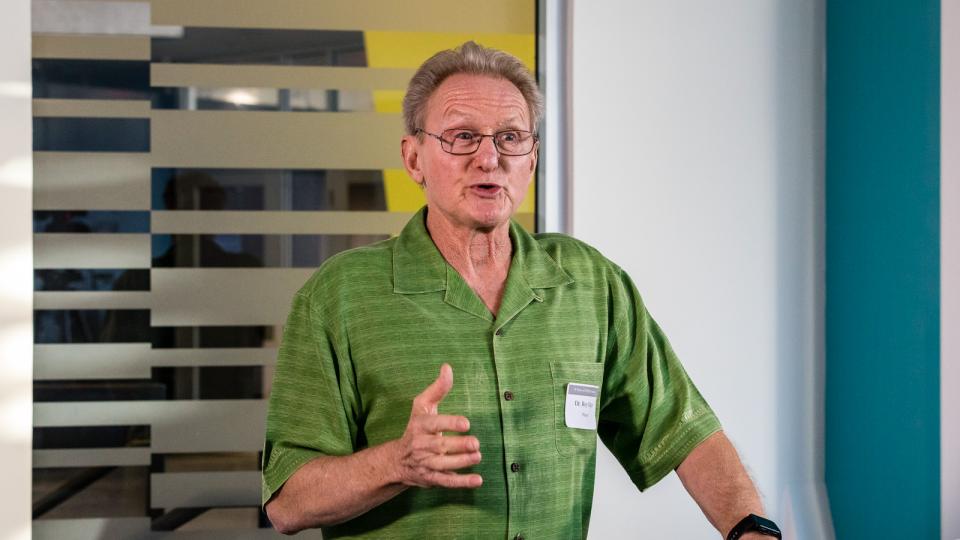Celebrating 50 years of TESOL at ASU
On October 11, 2019, the Department of English at ASU celebrated 50 years of graduate studies in English as a Second Language (ESL) education by hosting a mini conference. Many ASU TESOL enthusiasts, from alumni to faculty, came together in celebration of this historical milestone. Some participants came from great distances; one traveler even flew overseas 24 hours to reach ASU.
The conference kicked off with a luncheon, at which Krista Ratcliffe, chair of English, welcomed everyone: “[50 years of TESOL] is a very impressive achievement, with the impact locally and globally,” she said. “It’s astounding when you think about the network. I was trying to create some image in my mind… the globe of where the effect is and when you measure TESOL, particularly at ASU. 50 years of it. Wow.”
Co-chair of the conference and current linguistics and TESOL Associate Professor Mark James was up next after Ratcliffe. “It was about a year ago we realized the 50th birthday of the program was coming up," he explained. "So the faculty in the area got together with discussions among ourselves and students and we tried to brainstorm different ways we could mark this special occasion." He chuckled. “So we first checked with the Graduate College to make sure we got the date right." The group laughed. "And it is, it is 50 years, so we got that right.”
And James was indeed correct. The ESL graduate program at ASU began in 1969 and continued to grow successfully, morphing through several name changes to its current iteration: the Master of Teaching English to Speakers of Other Languages (MTESOL). The Department of English now offers the degree in-person and online.
The first presenter was Joan Berry, who graduated in spring 2005 when the degree was referred to as MTESL. “I had already taught ESL to adults for 13 years, but since I believe learning is a lifelong experience, a dream of mine had always been to get my master's. Therefore, I applied and came back.” She smiled. “I find having and fulfilling dreams an important part of life and so it’s probably not a surprise to any of you that my applied project topic was 'Dreaming in Second Language Acquisition.”' In her non-academic life, Berry is a board member with Ballet Arizona. She enjoys meeting dancers from around the world and being a part of the blending of plays through music and dance.
The next presenter, Zhanna Lagunova (MTESOL, fall 2014), focused on internationalization projects that she implemented at her alma mater in Tomsk, Russia. Starting as the associate director of the International Division at Tomsk State University, she was tasked with improving the development of English competence with university employees. “I also managed to implement my course, which I developed here with Ruby Macksoud,” she explained. “It was my internship project and my capstone project. It is a course on critical thinking and media literacy … and people actually liked it because they got to learn English and they got to learn some new skills, too.” She also established a Library International Resource Center where resources were made available in multiple languages. She currently works as a Tech Writer in IT and arranges clubs to practice English.
Michalina Mrugala (MTESL, spring 2005) looked at the many paths someone can take with a MTESOL degree. She began teaching ESL classes at various institutions and graduated from law school when she worked at the University of Houston’s Language and Culture program. She currently works at the University of St. Thomas helping STEM (science, technology, engineering, and mathematics) students with their academic English. Mrugula’s main presentation was on teaching students with disabilities. She went into details about what surprised her when she taught a student who was blind, about how to find resources, and about what to do next. “Do you think about what kind of references or comparisons you might use?” she asked the audience. “If you refer to a flower and use the color, will the student know what that means? You might need to use a different comparison, a different metaphor, a different simile.”
Ksenia Maryasova (Fulbright scholar and MTESOL, fall 2014) currently works in an academic writing center at the Higher School of Economics in Moscow helping staff and faculty prepare their publications for top international journals. She is a development manager and her main responsibilities include analyzing the needs of clients to improve current programs. Maryasova reflected, “[Clients] don’t really know how to structure their thoughts in an ‘English way’ because ‘Russian way’ of thinking is much more, I would say, like the structure is much longer so you kind of roam around and you never arrive at your final destination.” This prompted laughter from the audience before she continued, “And English is very straight to the point.” She is looking forward to more international collaborations in the future.
After a break for “birthday” cake, presentations continued with current PhD in linguistics and applied linguistics student Gilberto Pereira discussing how rhetorical, cognitive and social factors can influence an international student’s thesis writing. He explained that while working on his master’s thesis, he did a 10-month case study focusing on a Brazilian student doing her master’s in biology in the US. After going into detail and making connections with his findings, Pereira concluded that he found his subject was influenced by social and environmental factors, leaving the audience with more to think on. “If we teach writing,” he explained, “we cannot teach writing solely as a cognitive activity. It is a social activity.”
Myungsoo Chang (MTESOL, fall 2014) was teaching English in middle and high schools since 1995 in South Korea before coming to ASU in 2013. In her presentation, she pointed out the values of the ASU MTESOL program and how it benefited her teaching. Chang found that her students learned more about everyday English and felt comfortable using it in conversations when she implemented what she had learned from her TESOL classes. She was also happy to note a big milestone in her career: “With the help from Dr. Mark James, I was able to create my first ever publication on the topic of restructuring second language teacher education in South Korea … and the applied project was published in the Korea TESOL journal in 2016.” Now living in Los Angeles, Chang wants to take her TESOL knowledge and apply it in teaching Korean as a foreign language.
Xiaoyu Pei (MTESOL, spring 2017) not only completed her master's degree here but is currently in ASU's PhD in linguistics and applied linguistics program. Her presentation focused on managing foreign language anxiety and the debilitating effects of that anxiety. She is currently working on a qualitative case study for her doctoral program, looking at classroom anxiety in first-year undergraduate students. Although she is still gathering data, Pei is excited for the results: “It is hoped that my results will be offering some insights into how to manage foreign language anxiety and helping L2 learners feel positively about their language and learning.”
Several MTESOL alumni who could not make the event sent their stories about their satisfying career paths.
Read: 'Our stories with MTESOL'
The conference presentations by alumni and current students were capped off by a presentation by Roy Major, professor emeritus of English and former MTESOL program director.
Before beginning his main presentation, Major reflected back to the year the program began: “Let me tell you what I was doing in 1969. I was a graduate student in Anthropology at U of A, and I wanted to be a cultural anthropologist. There was no linguistics department [as] linguistics was part of anthropology.” Major explained that after graduating he went to Brazil for four years, where he taught English classes, sometimes as many as 40 per week, for all levels and ages. One of his most memorable experiences was with a private student, Juscelino Kubitschek, who was formerly President of Brazil.
Major discussed how teacher training in 1970 was very different than it is now. He explained that typically, people who spoke English were given some books and basically left to their own devices on how to teach it. “I learned a lot about grammar of English by teaching English,” he reflected. “I had to figure it out … English teaching has changed quite a bit.”
Starting in on his presentation, Major asked the audience to think about their own experiences with foreign accents as he continued with his own example: “In the late 1980s, I went back to Brazil to look at Americans who had lived there a long time to look at their change in accent, their English accent, and I went to a place I used to teach English 15 years before," he said. "I met the director and she looked like she was Brazilian, and I talked to her quite a bit… and I was listening to her and I was thinking, ‘Boy, her English is so good… I bet she studied in the United States.’” After asking her if she was from Rio, she stated she was from Michigan but that because her Portuguese was so good, Brazilians thought she was Brazilian, and Americans didn’t believe she was American because her accent in English had changed.
Major explained that learning an accent may make someone feel different because it involves a different part of your personality. He noted that this is because learning a second language not only involves a different part of the brain, but also a different part of the heart. Major continued throughout his presentation with anecdotes and further expanded on accents including the two main sources of accent, transfer of those accents, and universals or patterns in a language. He also showed the model of second language phonology that he created a few years ago: “I don’t know why I felt compelled to write a whole book. I could have just taken these three graphs and said, ‘Please, publish them.'’’ Laughter filled the room before he continued. “But three key things in doing good research is evidence, evidence, evidence.” In conclusion, Major explained that although there are many sociolinguistic affective factors and linguistics factors that affect accent and how someone produces the second language, all of this also influences how you perceive a foreign accent.
“There was so much positive energy when our former and current students came together,” reflected Regents Professor Elly van Gelderen, conference co-chair and current linguistics and TESOL faculty at ASU. “The event was academically and socially a highlight of the semester.”
Speaking as a past MTESOL alumna, I can say that it was a wonderful opportunity to be able to attend the conference and to learn all about what my fellow alumni are doing in the world of TESOL and linguistics today. I am happy to call myself one of the hundreds of TESOL students who have obtained their degrees at ASU these past 50 years. Here's to many more successful years of MTESOL!
Image 1: The MTESOL mini-conference graphic emphasized the knowledge transfer aspect of language education.
Image 2: Associate Professor Mark James helped organize the 50 Years of MTESOL conference. Photo by Bruce Matsunaga.
Image 3: Alum Zhanna Lagunova. Photo by Bruce Matsunaga.
Image 4: PhD student Gilberto Pereira. Photo by Bruce Matsunaga.
Image 5: Alum and PhD student Xiaoyu Pei told The State Press that the professors in ASU MTESOL helped ease some of the anxiety about language learning that she felt and set her up for success: "I just have so much affection for the program." Photo by Bruce Matsunaga.
Image 6: Professor Emeritus Roy Major gave the keynote address. Photo by Bruce Matsunaga.

